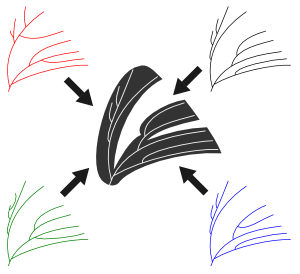
Primary in our understanding of evolutionary relationships are the molecular data from individual gene sequences. It is accepted that population‐level processes may generate considerable differences among gene histories for recently diverged taxa; however, the influence of these processes on ancient divergences has until recently received little attention. Using empirical estimates of diverse taxa such as angiosperms, mammals, and butterflies, I showed that there is considerable potential for short‐term processes to have a lasting impact on genomic history and thus our estimates of the tree of life (Oliver 2013). This issue will become increasingly important to address, as the potential for discordance actually increases as the number of loci sampled increases. Perhaps most importantly, this work demonstrates that genomic history will have a much more complex history than the canonical tree of life.
Additionally, our confidence in genealogical relationships often varies among loci, and estimates based on multiple loci should accommodate this variation in confidence. One approach to accomplish this is provided in the AUGIST package for Mesquite, where variation in confidence is explicitly incorporated into estimates of species trees (Oliver 2008).
Relevant publications:
- Oliver, J.C. 2008. AUGIST: Inferring species trees while accommodating gene tree uncertainty. Bioinformatics 24:2932-2933. doi: 10.1093/bioinformatics/btn556
- Oliver, J.C. 2013. Microevolutionary processes generate phylogenomic discordance at ancient divergences. Evolution. doi: 10.1111/evo.12047
